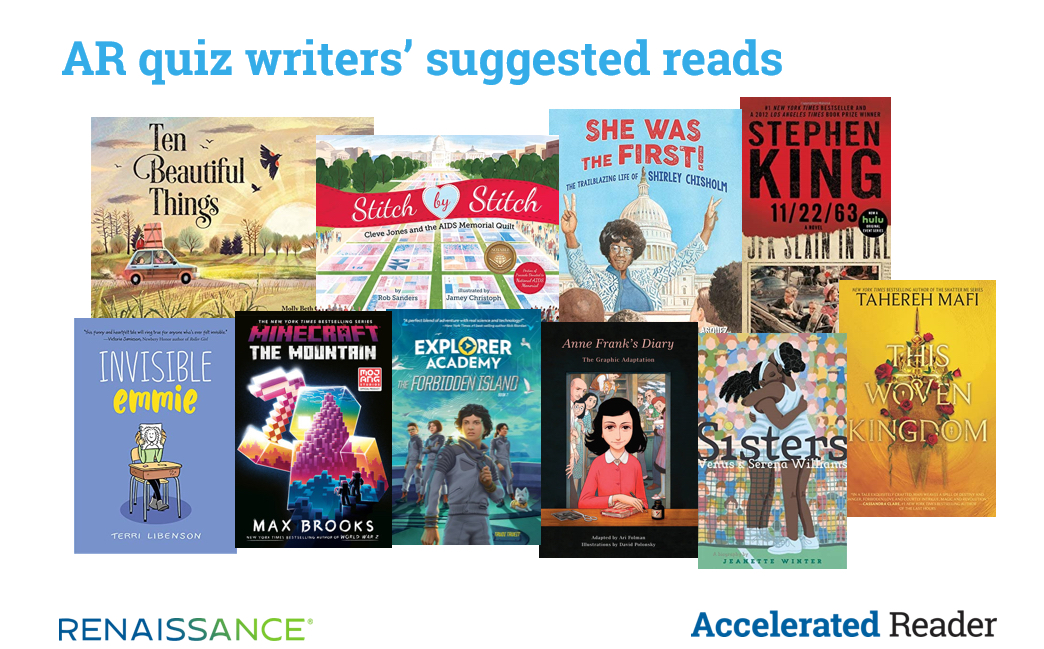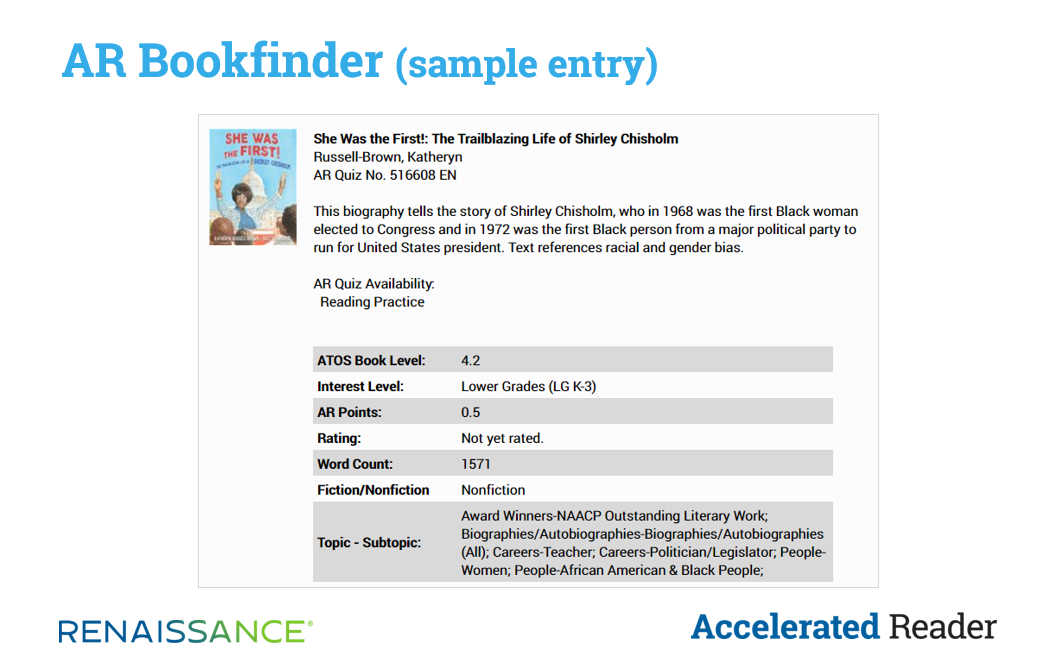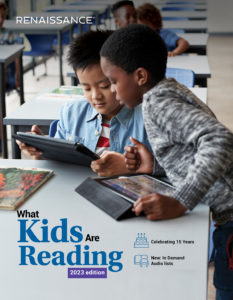October 28, 2022
For more than 35 years, educators have relied on Accelerated Reader to help inspire K–12 students’ reading practice. In earlier blogs, we answered two of the most common questions we receive about the AR program: how books are selected for inclusion and how we ensure AR meets the needs of today’s diverse students and communities. In this blog, we’ll answer two additional questions: Who writes new Reading Practice Quizzes for Accelerated Reader—and what does this process involve?
Read on for the answers, as four members of the AR Content Design team discuss their backgrounds, their working methods, and some favorite—and perhaps overlooked—books. Remember that you, your students, and their families can also visit AR Bookfinder, a free online resource for finding fiction and nonfiction titles that match each learner’s unique interests.
Michelle C: Inspiring middle-grades readers
“I majored in International Studies in college, and I then spent nine years working in the insurance industry. When my older son turned five, I left my position in order to homeschool him, meaning that I spent a lot of time reading children’s books. When I saw a posting for a part-time position writing Accelerated Reader quizzes, I knew it would be a perfect fit!
When writing quizzes, I gravitate toward Middle Grades books, especially those that will appeal to my sons. We’re big fans of the InvestiGator series by John Patrick Green and the Explorers Academy series by Trudi Trueit, as well as the Minecraft series by Max Brooks. The InvestiGator books are full of puns and quirky facts, while the Minecraft series touches on everything from castles to circuitry and has sparked my sons’ interest in learning more about these topics. In fact, my younger son recently asked me what life was like during the Middle Ages—a topic we’ll definitely be exploring this year.
This is a great example of how reading can open doors to new interests, while also teaching students important lessons. The Minecraft books, for example, tackle some big issues within their fictional universe: problem-solving, teamwork, resolving family conflicts, self-expression, and accepting others.
When I’m reading a book, I take detailed notes about plot points and characters, which I then use when writing the quiz. AR quizzes aren’t meant to be scavenger hunts, testing students’ memories of minor details. Instead, I follow the arc of the story, so students will—in a sense—relive the experience of reading the book and focus on what they learned.
One of the most challenging parts of quiz-writing is the distractors—answer choices that are incorrect but appear plausible to students who haven’t read the book. My notes are especially helpful here, so that I can draw on incidents and characters in the book when writing these incorrect (but believable) options.
I’m sometimes asked whether I feel a sense of accomplishment when my quizzes are published. The answer is: Absolutely! Each quiz I write expands the Accelerated Reader library, giving students a new choice in what to read. Our goal as Content Designers is to keep students reading—and to inspire them to follow their interests in choosing their next book.”

Barb F: Sharing a love of sports—and Shakespeare
“I’ve been writing Accelerated Reader quizzes for 28 years, and this would have been my dream job from the beginning—if I’d known it existed! I majored in English Education in college, and I then taught high school English and creative writing. One day I saw a newspaper ad with the headline ‘Read Children’s Books!’ Once I realized it wasn’t a scam, I decided to apply—and the rest is history.
Because I love baseball, I became known as ‘the sports person,’ and I’ve written quizzes for hundreds of sports-related books over the years. I’ve learned a lot, especially about hockey, golf, and other sports I wasn’t necessarily familiar with. I’ve written AR quizzes for at least a dozen books about Tiger Woods, for example, as well as Peyton Manning, Venus and Serena Williams, and many more.
As I’m reading a book, I stop to write potential quiz questions and the correct response—such as ‘How did Tiger Woods get his nickname?’ or ‘How old was he when he won his first tournament?’ Later, I’ll go back and write the distractors. This can be more difficult than people think, and I’ve had to abandon potential questions because it just wasn’t possible to write three plausible distractors to display alongside the correct answer.
Needless to say, the quiz-writing process has changed over the years. When I started, the emphasis was on literature, particularly titles that had won the Newbery Medal or Caldecott Medal. Over the last 15 years, the number of nonfiction books written for the Middle and Upper Grades has increased substantially—partly due to the focus on STEM, and partly due to new state learning standards that emphasize informational texts. We’ve also seen genres like graphic novels become much more popular. The number and variety of quizzes in Accelerated Reader has grown significantly to reflect these changes.
In addition to the sports books, I’ve had the opportunity to write AR quizzes for a wide range of titles during my time at Renaissance. I’ve written quizzes for Shakespeare plays and Stephen King novels, for instance. Recently, I’ve been drawn to biographies, and I created quizzes for books on Shirley Chisholm and Cleve Jones. I learned a lot while reading these books—an obvious ‘perk’ of the job!
Now that my own children are adults, writing AR quizzes also helps me to stay connected with new generations of children. I particularly enjoy the Emmie series of graphic novels by Terri Libenson, which address typical ‘kid’ problems—grades, family strife, bullies—in a very relatable way. I think this is so important today—not only to engage kids with well-written stories, but to remind them that they’re not alone.”
Kelli S: Introducing students to new worlds through books
“I majored in Elementary Education in college, and I taught grades 4 and 5 for several years. I then became a literacy interventionist and, eventually, an instructional coach, working with teachers and administrators on best practices in reading instruction and assessment. I also earned my master’s degree in Educational Administration, and I’m certified in the areas of Director of Instruction and Principal.
When COVID-19 hit, my husband and I made the decision to return to our hometown in central Wisconsin. I was very familiar with Renaissance programs—I’d used Accelerated Reader as a student, and I used Star Assessments, Freckle, and Nearpod as an educator. Joining the AR Content Design team was a natural fit. As a teacher, I made sure my classroom was full of books—from garage sales, thrift shops, book drives, etc. I also worked to ensure diversity in my classroom library, so that all students could see themselves represented while learning about other people’s experiences, too.
Over the past two years, I’ve become well rounded as a Content Designer. I’ve written 3-question quizzes for early reader books, along with quizzes for Lower and Middle Grades titles. I’m most drawn to Upper Grades books, however—especially fantasy novels. This genre has exploded over the last decade, due to the popularity of series like The Hunger Games and the rise of online fandoms.
A recent title that stands out in this genre is This Woven Kingdom by Tahereh Mafi. It’s based on a Persian epic and has some of the best world-building I’ve seen. I was completely immersed in the story, and I’d recommend it to high school students and librarians. It’s the first book in a series, and I’ll absolutely be reading the sequels, whether I get to write the Accelerated Reader quizzes or not!
In terms of process, I read all of the books digitally. As I’m reading, I copy key passages into a separate document, so I have major plot points in one place for later reference. I also write potential quiz questions as I read. Upper Grades books can include sensitive issues—violence, sexual situations, profanity—which I flag as well, so the appropriate trigger warnings can be included in AR Bookfinder.
Writing quizzes is a collaborative process, and I’ve benefitted from other Content Designers sharing their experience with me. We have exemplar quizzes for different genres of books and different types of questions, and I studied these closely when I was getting started. I also get great feedback from my editors, and I don’t hesitate to ask questions if I’m unsure of something.
I often find myself thinking of former students when I’m writing AR quizzes. Sometimes, it’s the realization that a certain student would really enjoy a particular book. In other cases, it’s a matter of empathy—of seeing the quiz from the students’ point of view. How can I ask about a complex topic in a clear way? How can I help students to see reading as a positive experience? As a teacher, my reach was limited to a single classroom. Now, my impact is much larger, reaching students not only in the US but around the world.”

Nikki R: Building excitement for reading, one title at a time
“In college, I studied Family Consumer Education, which focuses on child development, nutrition, sewing, etc. I taught both middle and high school and was also a substitute teacher before I joined Renaissance in 2013.
I’ve written Accelerated Reader quizzes for a wide range of books, although Young Adult novels are my favorite—especially historical fiction. Many of these are Upper Grades titles, but we’re seeing an increasing interest in history in the Middle and Lower Grades as well. The Diary of Anne Frank has been adapted as a graphic novel for middle-grades readers, for instance.
I’d describe myself as a fan of any book that keeps students engaged and makes them want to learn more. When done well, historical fiction hits both points. The characters and plot engage students and keep them guessing about what will happen next. Students also get insight into what life was like in the past, such as the treatment of women in the 1800s, or what civilians and soldiers endured during World War II. In this sense, a novel can really spark students’ interest in nonfiction, making them want to learn more about the American Revolution, the women’s suffrage movement, the moon landing, etc.
I often describe writing an AR quiz as ‘creative technical writing,’ in the sense that our goal is to engage students while also following best practices and our content appropriateness guidelines. The guidelines are helpful in dealing with sensitive issues—in Upper Grades historical fiction, for example, students might encounter violence, racism, or sexism—and we’re very careful with when and how we reference these issues in the quiz. We also regularly review and update existing book quizzes to ensure they continue to align with our guidelines and best practices.
In terms of process, I take detailed notes as I’m reading, which then help me to plan and write the quiz. Prior to the COVID-19 pandemic, the Content Designers went into the office one day per week to pick up print copies of books. Now, everyone works from digital copies, which mirrors many students’ reading experience—especially in schools that are using the myON digital platform alongside Accelerated Reader.
I’ve had the opportunity to write quizzes for some memorable books over the years, many of which I’ve recommended to my local librarian. A recent example is Ten Beautiful Things by Molly Beth Griffin. This is a wonderful title for elementary students, emphasizing gratitude and finding the beauty in everyday life. I know children have a lot of distractions today and may be tempted to scroll through their phones rather than opening a book. I think I can speak for the entire Content Design team when I say that our goal is to help make reading a positive experience for students—and to build a sense of excitement as they look forward to their next great read.”
Find popular titles
Looking for new and popular titles to engage your students this year? Check out What Kids Are Reading, the world’s largest annual survey of K–12 students’ reading habits. And to see everything today’s Accelerated Reader has to offer, click the button.

